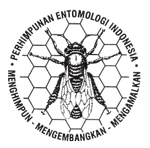Serangan hama invasif Spodoptera frugiperda (J. E. Smith) (Lepidoptera: Noctuidae) pada tanaman jagung di Kabupaten Ende Flores, Indonesia
DOI:
https://doi.org/10.5994/jei.18.2.153Keywords:
armyworm, attack, population, spreadAbstract
Corn is the main commodity in Ende Regency. One of the obstacles faced by farmers at the end of 2019 was the attack of the armyworm Spodoptera frugiperda (J. E. Smith) (Lepidoptera: Noctuidae) which is an invasive pest. Information about its spread in Flores are lacking. Therefore the aim of this research is to conduct a survey on the geographic distribution of S. frugiperda during the growing season of June–July 2020 in Flores, its infestation, and the presence of natural enemies. Observations were made on 200 sample plants in each of the 5 location. Calculations were made on the population level and intensity of attack. The intensity of the attack was measured using the Davis scale. The results showed that the pest population and attack intensity of S. frugiperda in the Rewarangga village was 8.15 individuals/plant and 76%, Lokoboko was 1.32 individuals/plant and 34%, Nanganesa was 2.48 individuals/plant and 51%, Rewarangga amounted to 5.96 individuals/plant and 55%, and Borokanda 3.31 individuals/plant and 42%. The natural enemies of S. frugiperda have not been found in the field.
Downloads
Downloads
Published
How to Cite
Issue
Section
License
Copyright (c) 2021 Yustina MSW Pu'u, Charly Mutiara

This work is licensed under a Creative Commons Attribution 4.0 International License.
Authors who publish with this journal agree to the following terms:
- Authors retain copyright and grant the journal right of first publication with the work simultaneously licensed under a Creative Commons Attribution 4.0 International License that allows others to share the work with an acknowledgement of the work's authorship and initial publication in this journal.
- Authors are able to enter into separate, additional contractual arrangements for the non-exclusive distribution of the journal's published version of the work (e.g., post it to an institutional repository or publish it in a book), with an acknowledgement of its initial publication in this journal.
- Authors are permitted and encouraged to post their work online (e.g., in institutional repositories or on their website) prior to and during the submission process, as it can lead to productive exchanges, as well as earlier and greater citation of published work (See The Effect of Open Access).








